Hello!
Is it holidays? Is it not? It’s a tricky time of year this October half-term. We’ve asked some questions to work out who’s in and out, (see below for more), and this week our questions will be cagier than usual because we can’t assume you are in school. So bear with as we ask more random things! It’ll all be worth it in the end. Promise.
Right, onto the results…
1.What To Do About Half Term
October half term is a tricky time. Some schools have it one week, some the other. Two-week half terms seem to be getting more popular. Though for teachers with school-aged children of their own, this makes life particularly difficult.
So, in an ideal world – which type of half-term holiday would teachers prefer?
Overall, it looks as if teachers quite like schools being able to decide for themselves:
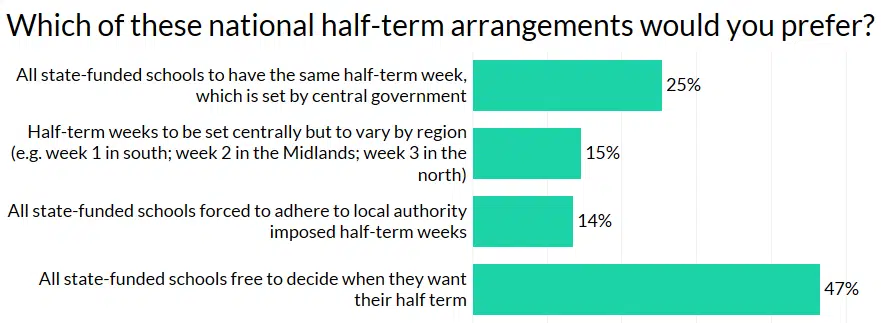
That said, there are some quirks. For example…
The west midlands came out more in favour of a nationally imposed solution whereas the south west much preferred schools to have their freedoms. (Any thoughts as to why? We have hunches, but they’re a bit loose…)
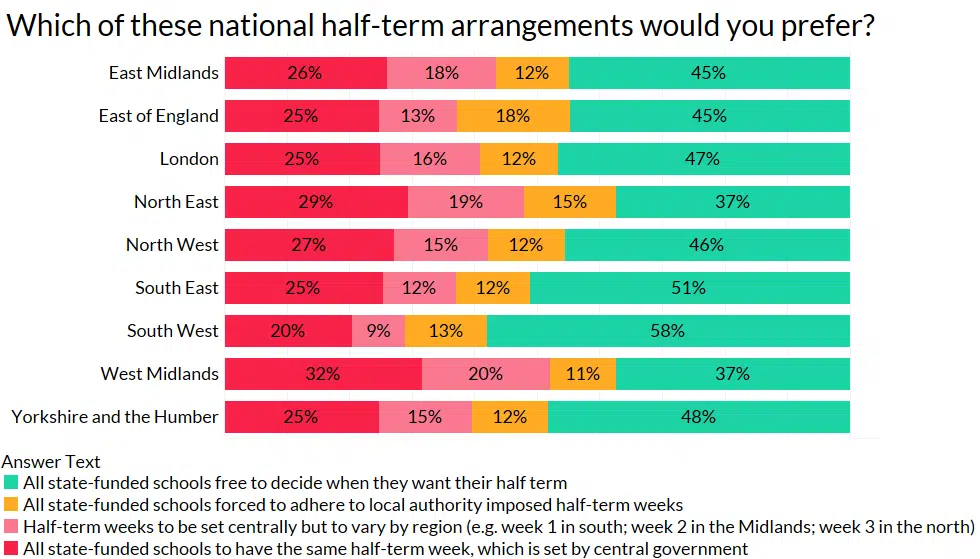
What about learning time?
Schools wanting a two-week October break might feel guilty about delivering less learning time to pupils. BUT, a week’s additional holiday is roughly equivalent to 15 minutes extra teaching time per day.
Hence, we asked teachers what they would prefer:
- A standard half term
- A two-week half term but a week took off the summer holidays, or
- A two-week half term but 15 minutes more teaching time per day.
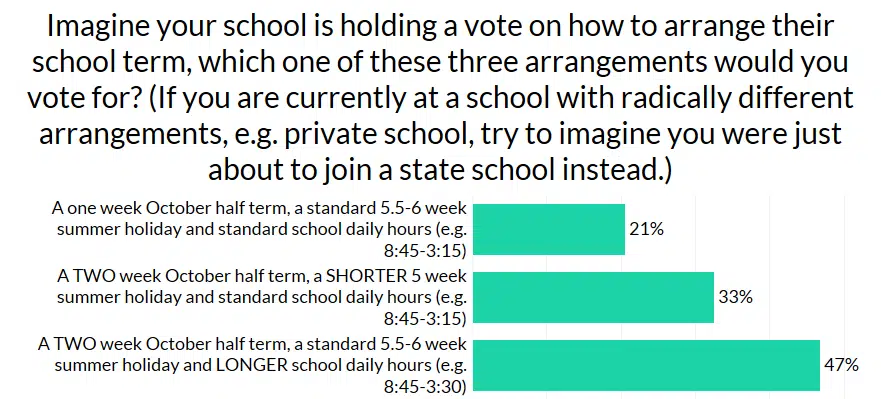
The 2-week October holiday, with a 15-minute daily trade up, was by far the most popular. Several users commented that this is because their school day was already that long, so it didn’t seem much of a sacrifice.
The trend for longer days was fairly equal across all age groups. However, over 40s showed a much greater preference for the standard pattern (one-week half-term, as shown in green below) than the under 40s group.
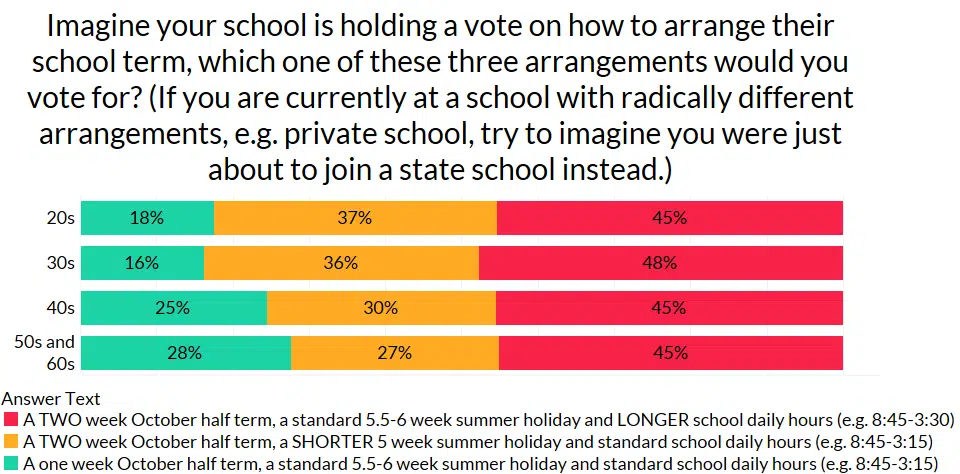
Is the difference caused by teachers in their 20s and 30s wanting to jet off on holiday during their breaks? ?Not really! Teachers in their 50s and 60s have planned more holidays abroad this October than those in their 20s.
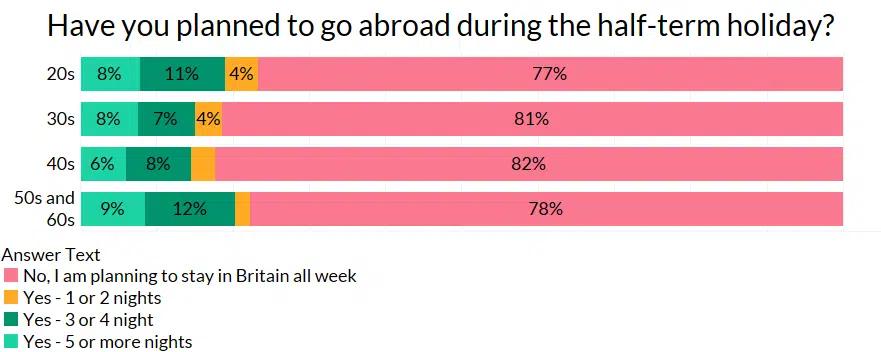
What the data does appear to show is that it’s hard to get this topic right. There’s no consensus on the length of school days, or holidays, or how those ought to be spread around. And, given the preference for autonomy amongst the profession, the government is likely correct in staying well away from this issue.
2.A Delusion of Inset
Schools are given five days a year to provide professional learning for teachers. On top of that, teachers often go to external courses, or take part in partnership work, study groups, observational peers, and so on. But does all of that time and resource help teachers get better at teaching?
Teachers are heavily divided about the idea the time for professional development enhances their instructional capabilities.
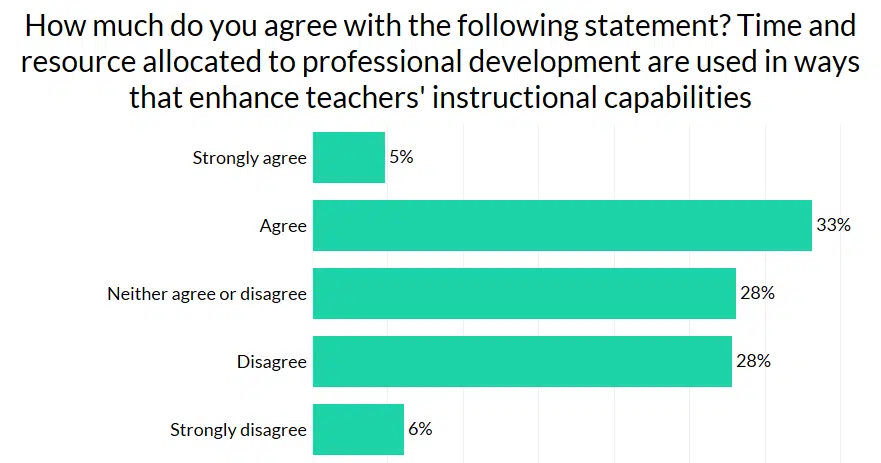
That division is more pronounced when looking at the seniority of teachers.
In both primary and secondary schools, senior leaders are much more likely than classroom teachers to believe that time and resources are helping teachers get better at their classroom delivery. Or, to put it another way, the people who are likely organising and choosing the professional development think it is more effective than those who are on the receiving end of it. ?
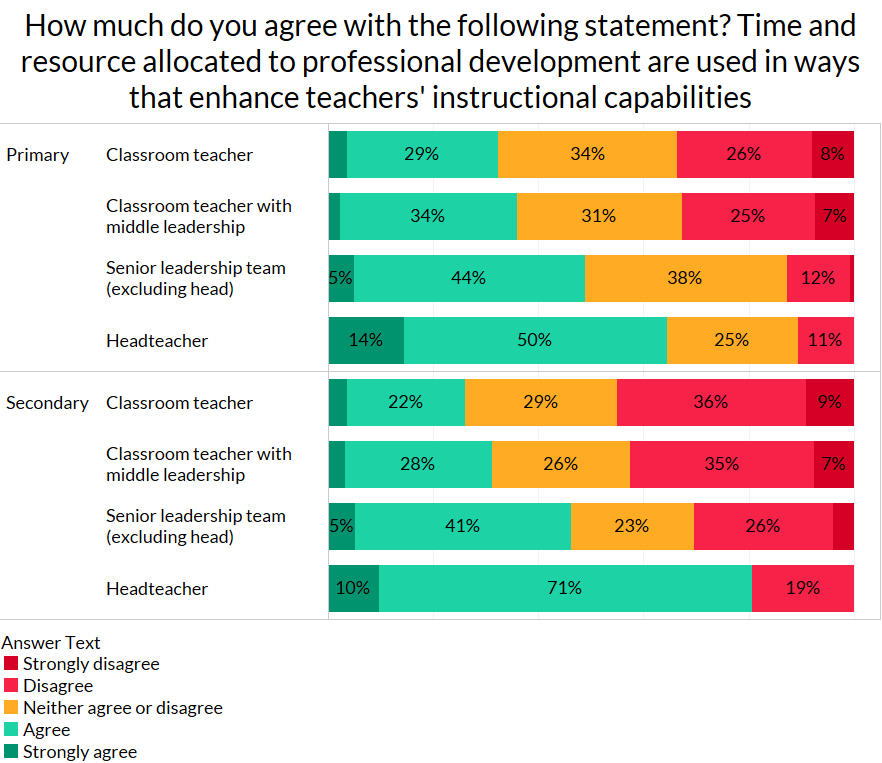
Across subjects, primary teachers were the most positive about professional development and English teachers were the most negative.

Does this mean we should get rid of CPD in schools? (At least in its current guise?)
Possibly not. Although teachers don’t always think resources are well-allocated, most (74%) do believe that CPD had at least a moderate influence on their classroom practice.
However, we again find that senior leaders feel CPD has been beneficial to their own teaching at much higher rates than do classroom teachers.
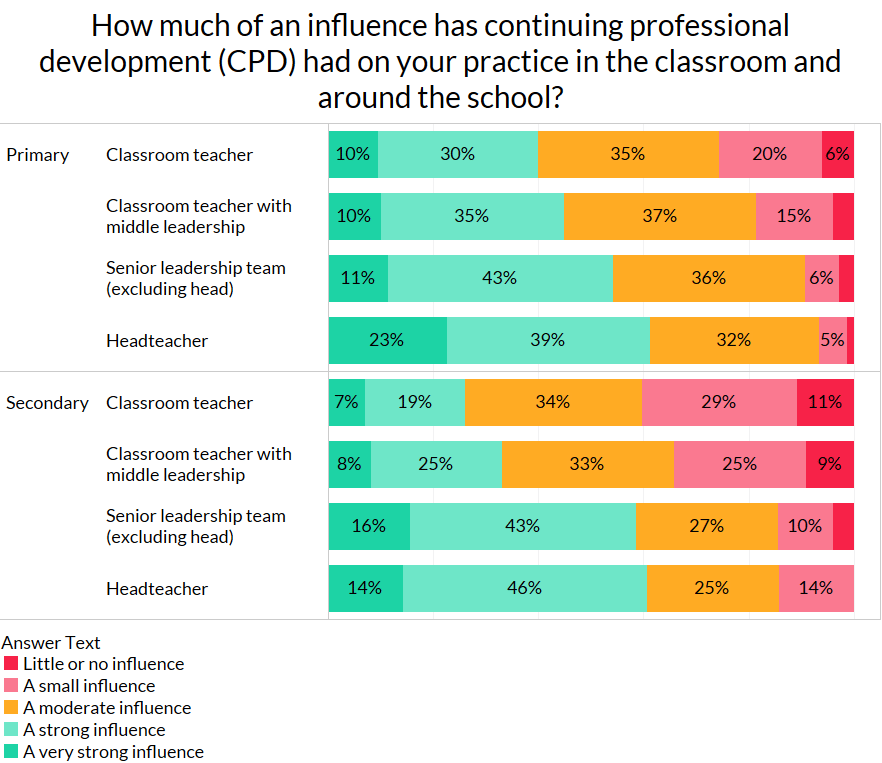
Is it surprising that heads and senior leaders responsible for professional development courses feel better served by them? Not really. If you control something, then you are likely to be able to target it towards your needs.
But heads and senior leaders need to remember that their own understanding of CPD may be far off what the rest of the staff are thinking. Just because something is good for leaders does not mean it will be good for everyone.
Also, about that ‘evidence-based INSET’…
School and senior leaders also say they have attended a higher proportion of evidence-based interventions over the past academic year. At secondary level, twice as many heads as classroom teachers said more than half of their development was done in an evidence-based way.
But how can there be such a big discrepancy? Either senior leaders are doing more evidence-based interventions, or they merely have the perception that they are. In the first case – senior leaders simpy do more evidence-based courses – we have to believe that senior leaders have access to higher quality materials that other teachers can’t access. If senior leaders are doing NPQ or masters courses, then this might be true. Senior leaders may also be more able to wangle a budget to go to an external seminar due to their lower teaching load.
On the other hand, it’s also possible that heads and senior leaders believe the INSET delivered in their school is more evidence-based than classroom teachers believe it to be. OR, classroom teachers don’t pick up on the fact that an intervention is evidence-based as readily as their senior colleagues.
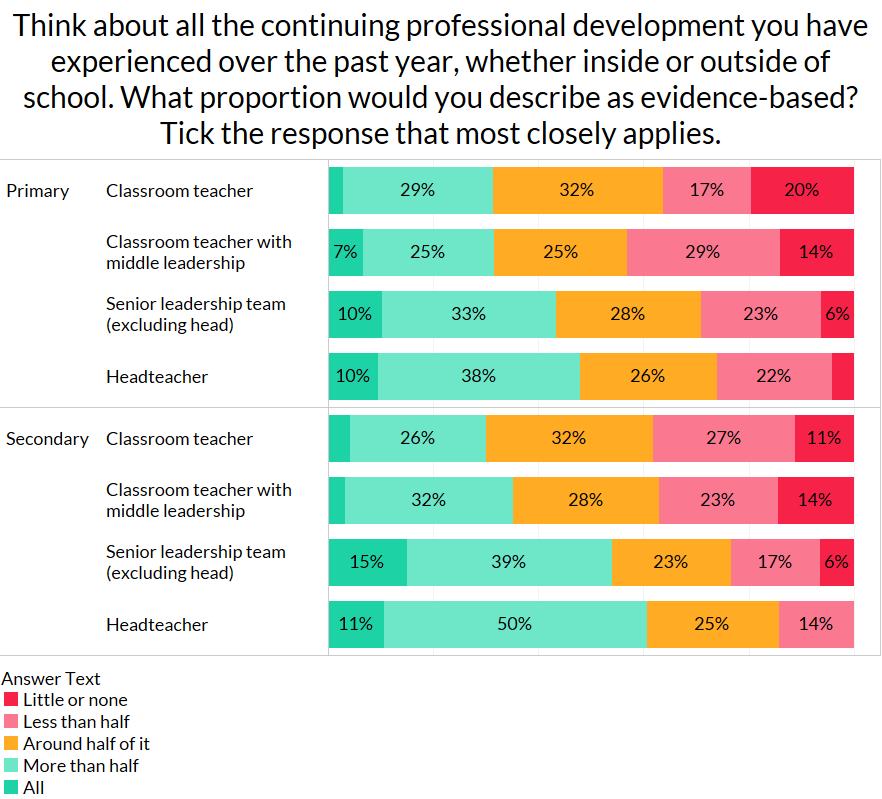
Either way it appears that senior leaders at least believe they are getting evidence-based training at twice the rate of classroom teachers.
INSET annihilation
A joy of Teacher Tapp is that we can create thought experiments. In our latest we asked people to believe that all INSET days are banned and there are no funds for professional training days. What would be the consequence within 5 years?
A whopping 20% of teachers (1 in 5) said that no INSET or training days would not impact them at all because their development comes from classroom practice and things they do on their own time.
A refreshingly honest, and impervious, 11% also said the loss wouldn’t have an impact because they would teach the same in 5 years’ time regardless of the courses they went on.
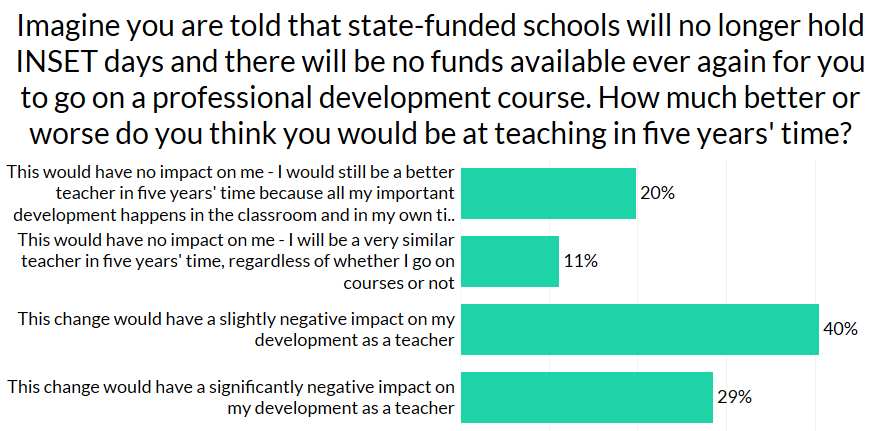
Note again, that senior leaders and heads would feel the loss of INSET and development days most heavily. (Yet again supporting the idea that the more experienced you get, the more you appreciate professional development).
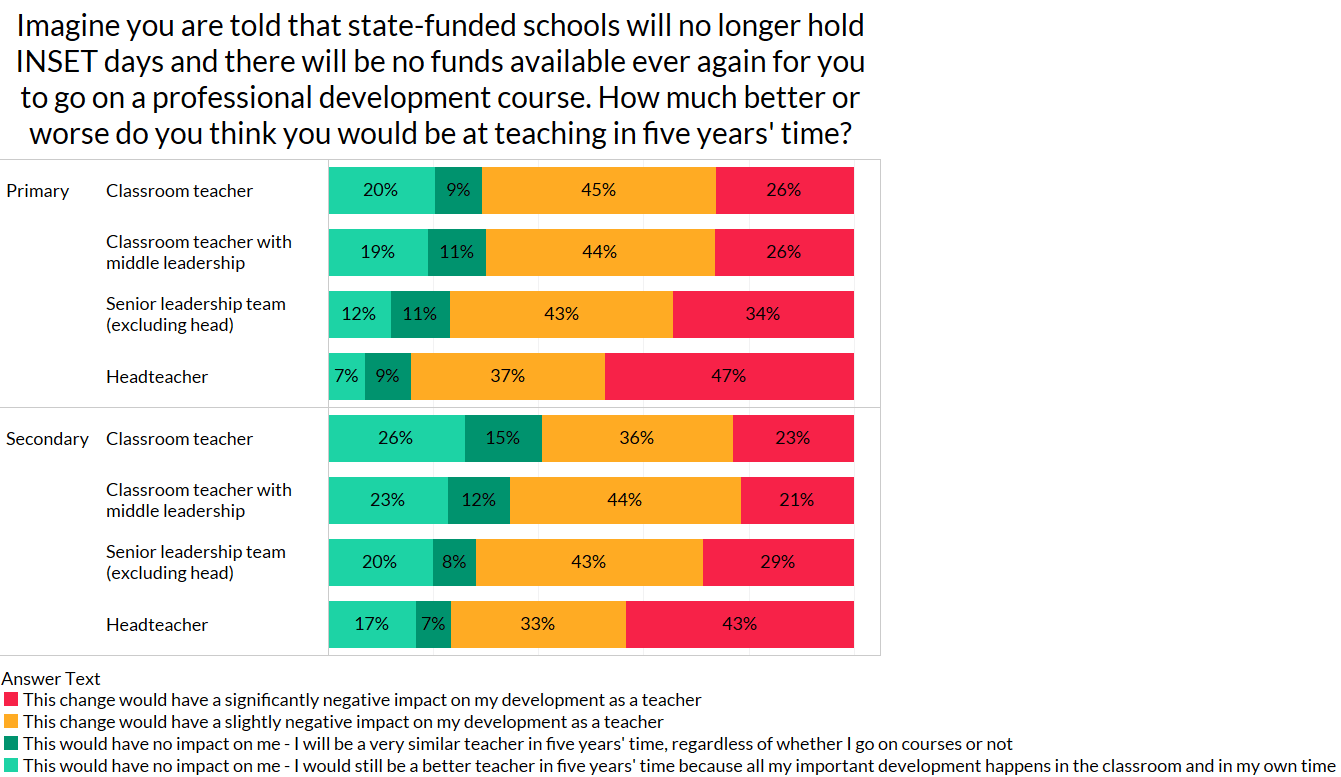
In Conclusion: if you’re a senior manager and you think all your staff feel positively about their professional development, you are probably over-estimating their enthusiasm. And if you’re NOT a senior manager, then I’m afraid the message is that you may not be so bothered about INSET days. Should you wish to become more so, however, the answer is to move up the promotion ladder.
3.Enforce This
For several weeks now we’ve been showing that poor behaviour in classes is a problem for around 40-50% of new teachers on any given day.
Also, as above, we found that senior leaders tend to over-estimate the extent to which rules are consistently enforced compared to the feelings of their teachers.
One thing we didn’t look at is whether rules are enforced differently in areas where children are wealthier or poorer.
From what we can see – there aren’t obvious or consistent patterns at primary school.
With secondary schools, rules are more consistently applied in secondary schools with poorer intakes, but the differences are not as large as expected.
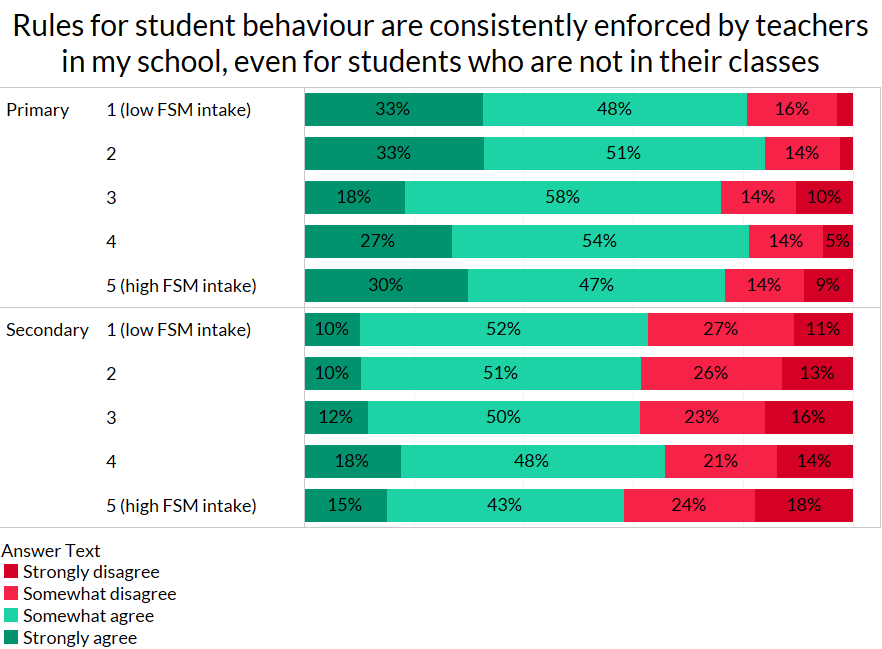
Note, however, that behaviour rules are much more consistently enforced in schools with higher Ofsted ratings.
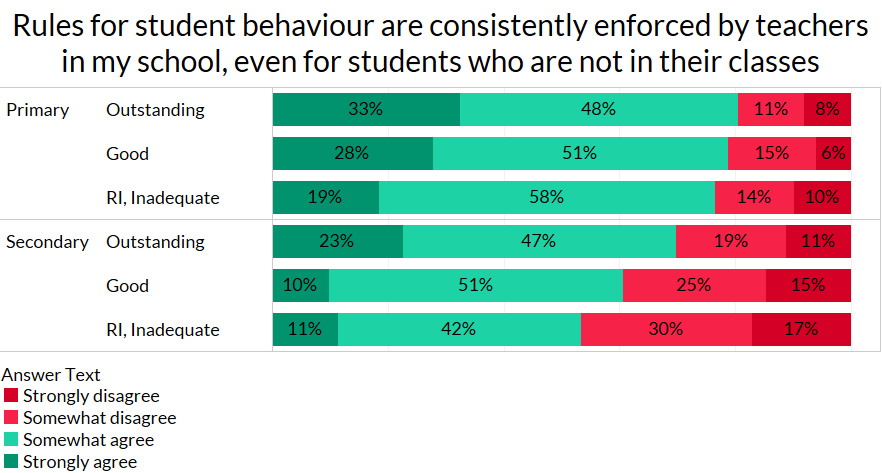
Consistency in rules appears possible across all intakes and correlates with a stronger Ofsted judgement.
But remember, ask the staff for views on how well the rules are enforced, rather than relying on SLT perception, as they can be quite different.
4.??Lock In
Last week we asked if you locked your classroom door with a key or an e-card. Alas, not everyone locks their room!
Several teachers got in touch which prompted us to find out some more detail. Hence this time we asked:
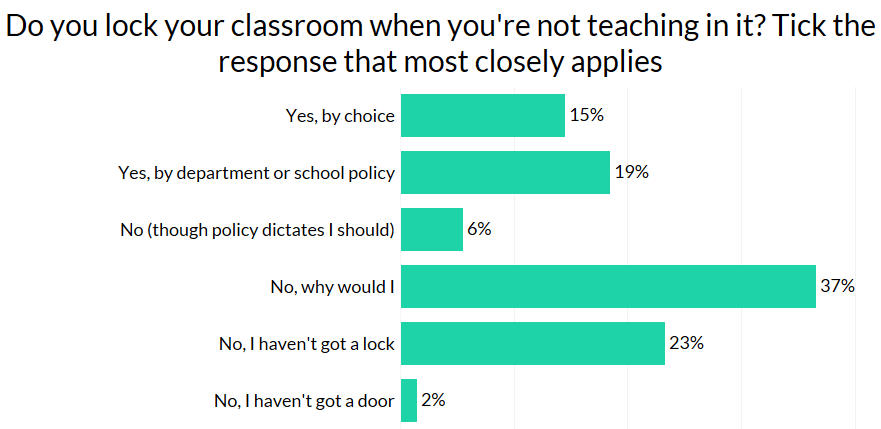
Further analysis found some quirks.
An unsurprising quirk: Primary teachers mostly DO NOT lock their classroom. (Around half don’t even half a lock).
Surprising quirk: 38% Science teachers DO NOT lock their classroom doors.
Why pick on science teachers? Because they have dangerous equipment and chemicals in their classrooms. It’s not a legal requirement to lock science classrooms, but it is very much advised and schools can be liable for accidents that occur if equipment is not locked away securely.
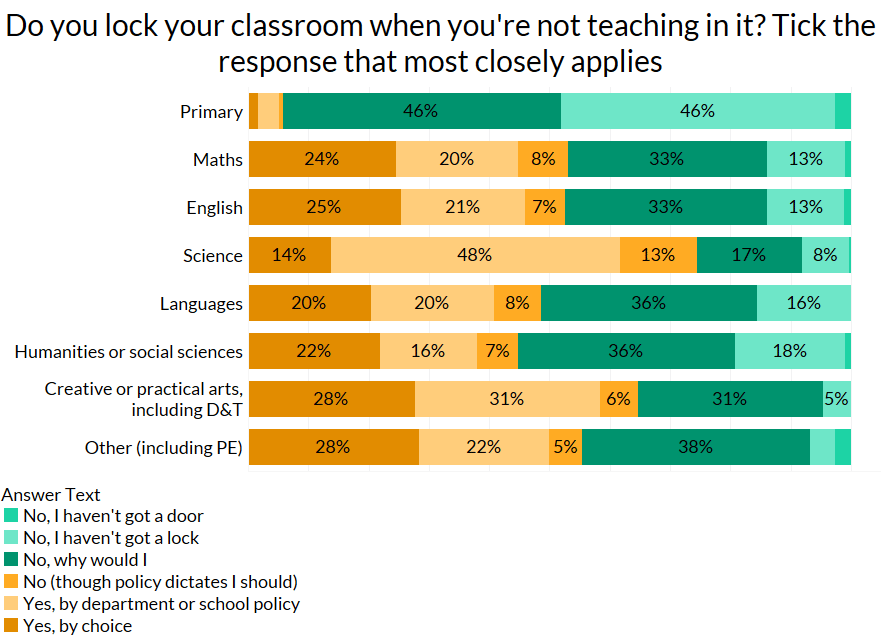
Humanities teachers, by contrast, seem to have more of an open door policy. Let’s hope no one injures themselves on a pile of textbooks!
*
5. Finally, as ever, we learned that you really love our daily tips, so here are the links for last week:
How to improve your concentration and focus
Teaching nothing new in a lesson
How to build a script for a lesson
Right folks – over and out for another week…
In the meantime, keep sharing what we are doing. Here’s a powerpoint slide (with script), a PDF, and a black-and-white one-pager to help.
Remember, we need more of you before we can do the really exciting and detailed analysis!
Enjoyed this post and want to join our Teacher Tapp panel?
Sign up via the iPhone App Store or the Android App Store.
You can also check out more at www.teachertapp.c






